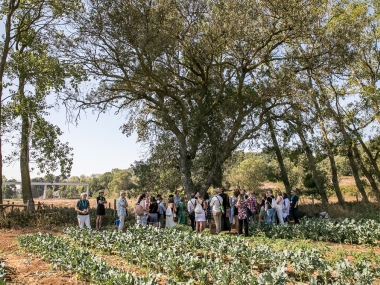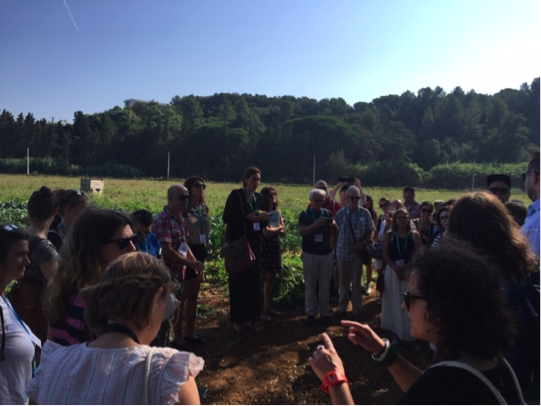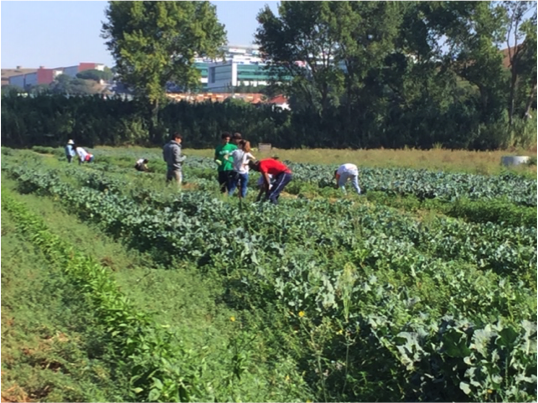Local food in urban forks
Edited on
17 July 2019Agri-food production can help with social inclusion says Miguel Sousa the Agri-Urban Lead Expert following the workshop held during URBACT City Festival in Lisbon in September 2018.
Agri-food production is key for cities.

Agri-food production is a mature industry that plays an important role in terms of GDP, employment, environmental sustainability and social integration. Here we share the knowledge of Agri-Urban and Semear(link is external) projects.
Food is actually one of the main urban challenges, but food is also at the centre of the debate on sustainable development. Food systems are essential for sustainable development: they are at the nexus that links food security, nutrition and human health, the viability of eco-systems, climate change, and social justice.
More than 7 500 million people need to be fed healthily, equitably and affordably while maintaining the ecosystems on which life depends. The evidence of the impact of diet on the health of people and the planet has grown enormously during recent decades, yet changing consumer eating habits, even for public health alone, not to mention planetary health, is proving difficult.
Power in the food system is becoming increasingly concentrated with mega-mergers in the seed, agri-chemical, fertiliser, animal genetics and farm machinery industries; this reinforces the industrial farming model, exacerbating its social and environmental costs. Globally, farmers are increasingly reliant on a handful and suppliers and buyers, squeezing their incomes. There is an urgent need to connect research and policy around an innovative and more integrated sustainable food security agenda.
That is why innovation, new business models and strategies must activate growth potential. Small and medium size European cities, especially those located in rural areas and with a local economy linked to agriculture and the agri-food system can play a leading role to face this urban challenge.
Visit to the SEMEAR agricultural land in Oeiras (ES) As part of a workshop during the festival, the team went out onto the field - literally - and visited Oeiras, near Lisbon.
As part of a workshop during the festival, the team went out onto the field - literally - and visited Oeiras, near Lisbon.
The SEMEAR team (SEMEAR - Exploração Agrícola SEMEAR - Terra de Oportunidades at Oeiras), Joana Santiago, Raquel Monteiro and Cecilia Duarte, explained how their sustainable program of social inclusion for children, young people and adults with intellectual and developmental difficulties works through training and development of skills, employability and socio-professional insertion, as well as agricultural production and transformation.
The preparation of the land took some months to be ready for agricultural production due to the lack of water. With the first crops consumed by local workers, a B2C approach was adopted, and it still works very well. SEMEAR doesn’t foresee a business agreement with retailers because of the lack of capacity to supply the market on a regular basis.
“Agricultural production is a tool to facilitate people’s integration into society, commercialisation and profitability is not a final goal” insists Joana Santiago.
Sustainability is always a key issue for organisations like SEMEAR and the participants tried to understand how the operations work in terms of financial sustainability. The revenue streams for SEMEAR were summarised by Cecilia Duarte and are based on a strong network with local donors, public grants from regional or national funding schemes and by selling their products to families around SEMEAR.
“It’s a goal to move to an organic production, but at this stage the transitional period is preparing the land”, says Raquel Monteiro.
The main outcome of SEMEAR is the social inclusion for young people and adults with Intellectual and Developmental Disabilities (IDD), through professional training, developing soft skills and promoting employability in agricultural and food industry trades
The agri-food sector as social integration
SEMEAR and Agri-Urban both work on social integration in agriculture for the young population, addressing the capacity of agriculture to promote (or to generate) therapy, rehabilitation, social inclusion, education and social services.
Agri-food to increase urban-rural links
 Small and medium-sized towns are key in providing a meeting point between urban and rural businesses, turning into hubs for employment, entrepreneurship and training for rural youth.
Small and medium-sized towns are key in providing a meeting point between urban and rural businesses, turning into hubs for employment, entrepreneurship and training for rural youth.
One can look more specifically at the examples of Fundão (PT), Mouans-Sartoux (FR), Petrinja (HR), Mollet del Vallés (ES) and Baena (ES). These cities’ Integrated Action Plans intend to improve links between urban centres and smallholder farmers and their organisations. Enhancing links between smallholders and market opportunities across agri-food value chains, creating decent employment in them, and fostering shared sustainable arrangements between urban and rural groups are necessary preconditions to create inclusive and sustainable rural-urban linkages.
Practical take-aways from SEMEAR and agri-urban experiences
Open agri-business to young people
Youths can become “agri-preneurs” along agri-food value chains, from production and aggregation to processing and marketing. Supporting their access to productive resources can help them invest in profitable smallholder agricultural activities.
Invest in hard and soft infrastructure
Access to energy, roads, communications and water infrastructure is essential, as well as facilitating the flow of goods, labour, money and information.
Operate both on labour supply and demand
Youths need access to quality training in order to develop relevant skills for the labour market (supply), and decent farm and non-farm employment opportunities within agri-food value chains (demand).
Integrate decent work aspects
Policies should improve working conditions of young women and men employed in agri-food value chains by extending social protection, workers’ rights, occupational health and safety, and rural workers’ groups.
Share and learn with successful case studies
Here are some Portuguese initiatives of the social and solidarity sector:
- PROVE: creating jobs and bridging the rural-urban divide;
- FRUTA FEIA(link is external): adding social value and reducing food waste;
- CABAZ do PEIXE(link is external): between the sea and the city, delivering fish protein and reducing fish waste;
- BIOVIVOS(link is external): tiny urban spaces can produce simple, healthy and nutritious food.
The engagement and commitment of local policymakers, social organisations, entrepreneurs and retailers is a key aspect for the sustainable development and the resilience of small and medium sized European cities.
 Submitted by Miguel Sousa on
Submitted by Miguel Sousa on




